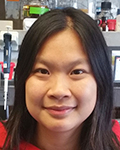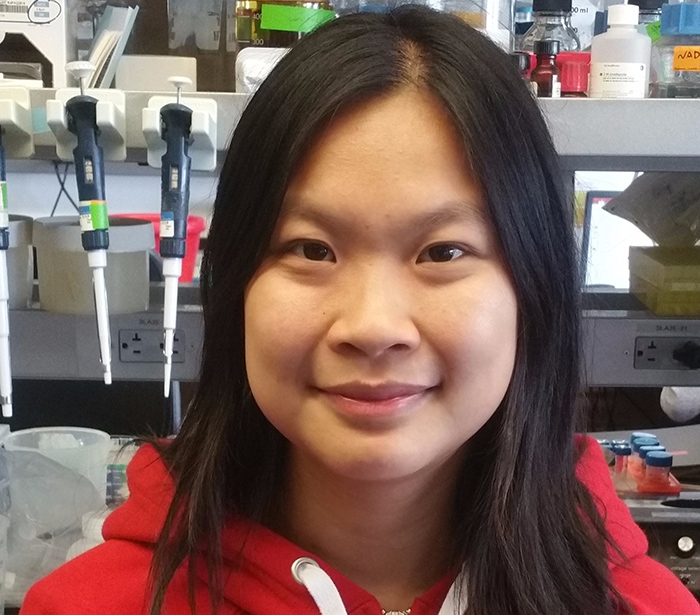We’re taking time over the following weeks to get to know the members of the GSA’s Early Career Scientist Committees. Join us every week to learn more about our early career scientist advocates.

Lucy Xie
Co-chair, Diversity Subcommittee
Stanford University
Research interest
The goal of my scientific research is to understand the molecular origin of partial penetrance in neurodegenerative diseases. Although age and genetic predispositions have emerged as key risk factors for neurological disorders, disease onset and clinical progression remain unpredictable. As the population grows older, neurodegenerative diseases such as Alzheimer’s and Parkinson’s disease have become increasingly prevalent; however, the vast majority of the aging population remains mentally alert, suggesting that old age alone is not sufficient to cause neurodegeneration. Similarly, the same genetic mutations found to be detrimental in some individuals have no discernible impact in others, raising the possibility that penetrance of sporadic neurodegenerative diseases relies on the complex interplay between aging and genetic vulnerability. For my postdoctoral research, I will take complementary approaches, using the model yeast Saccharomyces cerevisiae and African turquoise killifish Nothobranchius furzeri, to tackle this longstanding puzzle in biology.
Much of my graduate work has relied on the precise deletion and overexpression of specific genes to study the genetic basis of heritable traits. However, these genetic alterations typically do not occur in nature. Instead, the complexity of the genetic landscape underlying a disease phenotype is often driven by a combination of allelic variants. My long-term goal is to characterize the genetic architecture of complex traits and to harness the therapeutic potential of naturally occurring genetic variants in the diagnosis and treatment of devastating age-dependent neurodegenerative diseases.
As a PhD-trained scientist, you have many career options. What career paths interest you the most?
I am interested in a career path that will provide me with a constant source of intellectual stimulation. To me, every biological question is an intricate puzzle. I often find myself lost in thought experiments while exploring the various possible outcomes. One of the most challenging puzzles in biology is aging. As such, I would like to dedicate my career advancing our understanding of age-related diseases. Ultimately, I strive to become an independent academic researcher in the biomedical sciences, one that crosses disciplinary boundaries to tackle challenging research problems and pioneer novel approaches to address complex scientific questions.
In addition to your research, how else would you like to advance the scientific enterprise?
In my early scientific career, my mentors played a pivotal role in my development as a young scientist. Many of the teaching assistants (TAs) for my undergraduate courses obtained a PhD but chose not to stay in academia. I remember asking them for career advice and feeling very discouraged. I would never have embarked on this journey if it wasn’t for Dr. William Navarre, my undergraduate supervisor. He took a chance on me when I was a sophomore and instilled in me the confidence to pursue science as a career. I am equally grateful to my PhD advisor, Dr. Leah Cowen. She is an incredibly passionate scientist, and her enthusiasm towards science was a constant source of motivation throughout my PhD. Therefore, I fully appreciate the importance of supportive mentors and positive role models in the training of early career scientists. During my PhD, I became a TA for two undergraduate genetics lab courses. In my mind, I envisioned the TA that I always wanted but never had. For three years, I taught students fundamental concepts and techniques in molecular genetics and guided them in the early stage of their career development. I would like to dedicate my career serving the scientific community by continuing my mentorship efforts and helping young scientists reach their full potential.
As a leader within the Genetics Society of America, what do you hope to accomplish?
I strongly believe that advancement in science is a collaborative effort. As a co-chair for the Early Career Scientists Diversity Subcommittee, I hope to build a supportive and inclusive community for graduate students and postdoctoral fellows to connect with their peers, share their experiences, and foster collaborative relationships that benefit the individuals and the scientific community. I was a member of the GSA during the course of my PhD, and I have benefited tremendously from conferences and workshops hosted by GSA. I see these meetings as unique opportunities for young scientists to reach out and connect with individuals in their scientific community who can help support their scientific training and career development. I was fortunate to have found supportive mentors and collaborators outside of my research institution through courses and meetings, and I would like to take this opportunity to help early career scientists to build meaningful and lasting relationships with established scientists in their field.
Previous leadership experience
- Founder – Fly with Origami, Learn to Dream (FOLD), University of Toronto
- Treasurer – Board of Directors, York Condominium Corporation No. 65
- Volunteer Co-Chair, Registration Chair – Relay for Life, Canadian Cancer Society
- Volunteer Coordinator – Human Biology Students’ Union, University of Toronto
- Teaching Assistant – Department of Molecular Genetics, University of Toronto
Contact
https://www.linkedin.com/in/jinglin-lucy-xie-525b6822/































